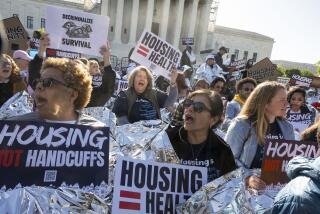Editorial: Should authorities have ignored a homeless woman’s refusal to go to a shelter during a storm?
The death of Barbara Brown, a 60-year-old homeless woman, from exposure to the cold rain on skid row is just the kind of tragedy officials and advocates feared would occur among the 28,000 homeless people who live without shelter on a typical night in Los Angeles County. It’s not that no one tried to help Brown. Los Angeles Homeless Services Authority officials said their emergency response teams repeatedly spoke to her and urged her to enter a shelter. Los Angeles Police Department officials said the same about their officers. A friend called 911. But Brown refused all offers of help and died on the sidewalk last week in a wet blanket without a tent.
It’s heartbreaking, but was it preventable? Police, the Homeless Services Authority and the city attorney all say that under California law, they have no legal right to drag a person into a shelter against his or her will. “You can’t kidnap someone,” said LAPD Lt. John Jenal. Police can’t arrest a person simply because they’re out in the rain or cold. Homeless Services Authority workers can’t take people to a shelter without their consent.
The fact is, homeless people have the right to make decisions for themselves.
The fact is, homeless people have the right to make decisions for themselves. That includes the right to sleep on the sidewalk at night in Los Angeles if they have nowhere to go and the right not to have their belongings taken without warning and not to be rousted for sleeping in their cars. But society also has an interest in keeping its citizens safe and healthy. The challenge is to find the proper balance when dealing with people who lack the resources, and sometimes the mental wherewithal, to protect themselves. What, if anything, can be done to prevent further deaths on the streets during what’s expected to be an unusually harsh and rain-swept winter?
One tactic is to declare certain parts of the region to be disaster areas that pose an imminent danger. L.A. police are already doing that with riverbeds during rainstorms. That gives them the power to order people away from rain-swollen riverbeds even if it means that people have to be forcibly removed. This seems reasonable and prudent.
Outreach workers from the Homeless Services Authority and from nonprofit groups can be out on the streets warning people of the impending storms, as they have been since the rain started and before. Obviously, they should keep doing so.
And if that doesn’t work, police do have the power under certain circumstances to bring a person in for psychiatric evaluation; if the person is determined to be mentally ill and a danger to himself or others, he or she may then be confined under Section 5150 of the California Welfare and Institutions Code.
Police say that a simple refusal to come in out of the cold is not sufficient reason to be declared a danger to oneself. But Brown’s was not a simple refusal: She was widely known to have mental health problems; social workers apparently knew her and were in touch with her. Is it absolutely clear that there was not enough justification to bring her in for evaluation?
Some advocates for homeless people argue that refusing to come in off a cold, rainy street is almost by definition an indication of mental incapacitation. But whether someone’s mental state is so impaired that it requires an involuntary hold in a psychiatric ward of a hospital involves a complicated assessment by a skilled professional. The 2,000 winter shelter beds that the Homeless Services Authority made available last week during the rains ranged from 50% to 80% full. That means thousands of unsheltered homeless people chose not to go to shelters. Some no doubt found refuge in cheap motels or cars, but others must have remained outside. Were they all mentally ill, but luckier than Barbara Brown?
Police officers should use Section 5150 sparingly, and only after consulting with a mental health professional or other medical professional on the scene. But they should do so when they feel it may be necessary to save a life.
The tension between the rights of homeless people and the government’s interest in maintaining safety, health and public order is not a new one. As the winter continues, the authorities will be called upon to balance the two in all sorts of disparate situations. We hope that in doing so they will remember that they could be the last line of defense for those who can’t defend themselves.
Follow the Opinion section on Twitter @latimesopinion and Facebook
More to Read
A cure for the common opinion
Get thought-provoking perspectives with our weekly newsletter.
You may occasionally receive promotional content from the Los Angeles Times.






